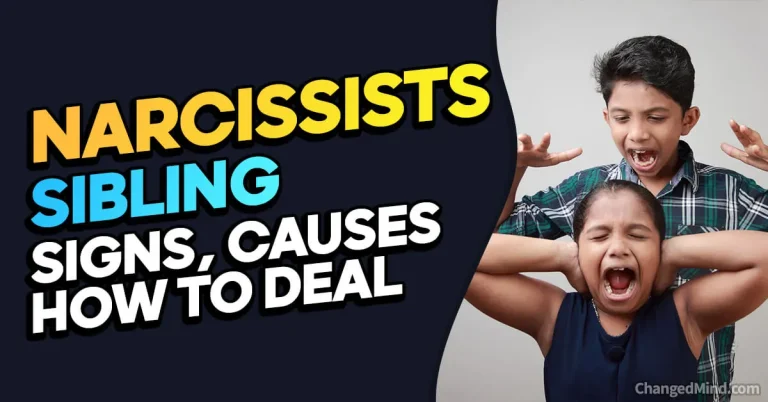Ever met someone who could turn even a simple sneeze into a grand opera, demanding an audience for every trivial act?
Welcome to the world of narcissists, where the thirst for attention flows like an endless stream. In this article, we’ve got the spotlight on narcissistic behaviors – 26 Signs a Narcissist Wants Your Attention. Curious about the signs?
Well, prepare to uncover the covert (and not-so-covert) tactics narcissists use to grab your attention. Whether you’ve got a narcissist in your life or just a fascination with the psychology of attention-seekers, keep reading.
This show is about to begin!
In this article, we’ll delve into:
- Subtle and not-so-subtle signs of attention-seeking.
- The psychology behind narcissistic behavior.
- Strategies for dealing with attention-hungry individuals.
- Tips for maintaining healthy boundaries.
So, if you’re ready to navigate the world of narcissists with a bit of humor and a lot of insight, let’s dive into the signs that’ll have you saying, “Spotlight, please!” Signs a Narcissist Wants Your Attention, right this way.
Narcissism and attention-seeking behavior often go hand in hand, leading to a constant need for validation and admiration from others. Understanding the nature of narcissism and how it manifests in attention-seeking behavior is crucial in identifying and dealing with such individuals.
This article will delve into the signs and behaviors exhibited by narcissists when seeking attention, as well as the impact it can have on relationships.

To comprehend narcissism and attention-seeking behavior, it is essential to define what narcissism is and how it influences individuals. Narcissism is a personality disorder characterized by an inflated sense of self-importance, a constant need for admiration, and a lack of empathy for others.
Attention-seeking behavior refers to actions or behaviors that individuals engage in to draw attention to themselves and satisfy their need for validation.
Many narcissists seek attention as a way to maintain their grandiose self-image and affirm their superiority. This behavior may stem from deep-rooted insecurity and a desire to reaffirm their self-worth. By seeking attention, narcissists attempt to ensure that they are constantly in the spotlight and receiving praise and admiration from those around them.
There are various signs that can indicate attention-seeking behavior in narcissists. These include constant bragging, exaggerating achievements, interrupting conversations, seeking validation, making everything about themselves, playing the victim, fishing for compliments, constantly seeking praise, being loud and attention-grabbing, and seeking special treatment.

Other signs may include frequently changing their appearance, creating drama, engaging in excessive self-promotion, disregarding boundaries, and using social media as a platform for attention-seeking behavior.
It is important to recognize the impact that narcissistic attention-seeking behavior can have on relationships. These individuals often prioritize their own needs and desires above those of others, leading to difficulties in maintaining healthy and balanced connections.
The constant need for attention can create toxicity, resentment, and imbalance within relationships, leading to emotional and psychological distress for those involved.
Dealing with narcissists who seek attention can be challenging, but setting clear boundaries, practicing self-care, and seeking support from professionals or support groups can help navigate these relationships effectively.
Understanding and recognizing the signs of attention-seeking behavior in narcissists is crucial in protecting one’s well-being and maintaining healthy relationships.
In this article, we will explore the various signs of attention-seeking behavior in narcissists and delve into the impact it can have on relationships.
By gaining insight into these behaviors, individuals can better understand and navigate interactions with narcissists who seek attention.

Key takeaways:
- Narcissists constantly seek attention: They engage in attention-seeking behaviors such as constant bragging, exaggerating achievements, and interrupting conversations to make everything about themselves.
- Narcissists use manipulation tactics: They employ tactics like fishing for compliments, provoking others, and stealing the spotlight to ensure they receive the continuous attention and admiration they crave.
- Narcissistic attention-seeking behavior affects relationships: Dealing with narcissists who constantly seek attention can be challenging, as their behavior disregards others’ needs and often leads to emotional manipulation and strained relationships.
26 Signs a Narcissist Wants Your Attention
| Signs a Narcissist Wants Your Attention | Meanings from Their Perspective |
|---|---|
| Constantly talks about themselves | They believe their life and experiences are more important. |
| Brags about their achievements | They seek validation and admiration for their accomplishments. |
| Always seeks praise and compliments | They require constant reassurance of their worth and superiority. |
| Interrupts or dominates conversations | They want to control discussions and be the center of attention. |
| Disregards your feelings or needs | Their desires and agenda always take precedence. |
| Uses charm and flattery to win you over | They employ tactics to manipulate and captivate your interest. |
| Plays the victim to gain sympathy | They want you to feel sorry for them and come to their rescue. |
| Criticizes or belittles your opinions | They view their viewpoints as superior and dismiss yours. |
| Becomes jealous or competitive | They can’t stand the focus shifting away from them. |
| Makes grandiose promises or plans | They use future plans to keep you engaged and interested. |
| Guilt-trips you for not paying attention | They make you feel responsible for their feelings of neglect. |
| Gives extravagant gifts or gestures | They use gifts to buy your affection and admiration. |
| Invokes pity with stories of hardship | They want you to feel sorry for them and be more attentive. |
| Manipulates with emotional outbursts | They create drama to ensure you’re focused on them. |
| Uses humor to deflect attention | They make jokes or funny remarks to keep the spotlight on them. |
| Exaggerates their problems or accomplishments | They amplify their stories to capture your interest. |
| Acts as the expert in every topic | They want to appear knowledgeable and superior in all areas. |
| Sends excessive texts, calls, or messages | They flood your communication to keep you engaged. |
| Expects you to drop everything for them | They assume they’re your top priority at all times. |
| Becomes sulky or withdrawn if ignored | They sulk or give you the silent treatment to get your attention. |
| Manipulates with guilt trips | They make you feel guilty for not paying more attention to them. |
| Feigns illness or distress for sympathy | They pretend to be sick or in trouble to elicit your concern. |
| Monopolizes social gatherings | They dominate social events to ensure all eyes are on them. |
| Invades your personal space or boundaries | They disregard your limits to be closer to you. |
| Complains about feeling neglected | They vocalize their perceived neglect to make you feel guilty. |
| Uses emotional blackmail to get attention | They threaten emotional consequences if you don’t focus on them. |
These signs reveal a narcissist’s tactics for gaining attention and control in various situations.
Here are 26 Signs a Narcissist Wants Your Attention:
- Exaggerates achievements: They often inflate their accomplishments.
- Talks mostly about themselves: Conversations revolve around them.
- Brags about everything: Continuously boasts about their success.
- Interrupts conversations: Can’t wait to share their thoughts.
- Seeks compliments: Fishes for praise and admiration.
- Acts like a victim: Plays the victim card for sympathy.
- Creates drama: Instigates conflict to be the center of attention.
- Competes to win: Always tries to outshine others.
- Drops influential names: Mentions well-connected contacts.
- Overuses social media: Craves likes and comments online.
- Mirrors your interests: Copies your hobbies and preferences.
- Dresses attention-grabbing: Wears provocative or unique outfits.
- Goes overboard with gifts: Excessively showers with presents.
- Plays hard to get: Keeps you guessing to create intrigue.
- Idealizes you initially: Overwhelms with affection at first.
- Charms with charisma: Uses charm to captivate people.
- Disrespects boundaries: Invades personal space and privacy.
- Showers with affection: Demonstrates excessive love.
- Guilt-trips you: Makes you feel responsible for their happiness.
- Gives the silent treatment: Ignores you for attention.
- Flirts inappropriately: Engages in flirtatious behavior.
- Hosts pity parties: Frequently complains about difficulties.
- Blames others: Holds others accountable for problems.
- Manipulates perception: Uses gaslighting to confuse you.
- Gets jealous easily: Becomes envious of your attention elsewhere.
- Always has emergencies: Frequent crises requiring your help.
These signs serve as a guide to recognizing attention-seeking behavior in narcissists and maintaining healthy boundaries.

Understanding Narcissism
Understanding narcissism is crucial in identifying and dealing with individuals who display narcissistic traits. Narcissism, a personality disorder characterized by an excessive sense of self-importance, a constant need for admiration, and a lack of empathy for others, requires understanding to effectively manage relationships.
Here are some key points to consider when seeking to understand narcissism:
- Recognize the signs: Familiarize yourself with the common behaviors and traits exhibited by narcissistic individuals, such as grandiosity, manipulation, and a lack of empathy.
- Understand the root causes: Understanding narcissism involves acknowledging that it can stem from a variety of factors, including childhood trauma, insecure attachment styles, and a lack of emotional validation.
- Differentiate between healthy self-esteem and narcissism: While self-confidence and positive self-esteem are healthy, understanding narcissism means recognizing that it involves an inflated sense of self-worth that disregards the needs and feelings of others.
- Set boundaries: Establish clear boundaries with narcissistic individuals to protect your own well-being and prevent emotional manipulation.
- Seek support: If you are in a relationship with a narcissist or regularly encounter narcissistic individuals, it is important to consider seeking therapy or support groups to help you navigate these challenging dynamics.
Understanding narcissism enables individuals to recognize and protect themselves from the harmful effects of narcissistic behavior. By setting boundaries and seeking support, one can effectively manage relationships with narcissistic individuals.

What is Attention-Seeking Behavior?
Attention-seeking behavior refers to actions or behaviors individuals engage in to gain the attention or validation of others. It is a way for individuals to satisfy their deep need for recognition and affirmation.
People who engage in attention-seeking behavior often demonstrate an excessive desire for attention and continuously seek ways to be the center of attention in social settings.
These behaviors can manifest in various ways, such as constantly seeking praise or admiration, exaggerating achievements or experiences, making grandiose gestures, or constantly talking about oneself. Attention-seekers may also resort to provocative or disruptive behaviors to elicit a reaction from others.
While attention-seeking behavior is common and can be seen in individuals of all ages, it can become problematic when it interferes with healthy relationships or negatively impacts one’s overall well-being.
It is important to understand that attention-seeking behavior stems from deep-seated emotional insecurities and may require professional support to address underlying issues.
Fact: Studies have shown that attention-seeking behaviors are more prevalent in individuals with narcissistic personality traits.

Why Do Narcissists Seek Attention?
Narcissists seek attention for a multitude of reasons driven by their incessant need for validation and admiration. Attention serves as a crucial narcissistic supply, amplifying their ego and self-esteem.
One of the reasons why narcissists are inclined to crave attention is their profound insecurity. They possess a delicate self-image and yearn for external validation to bestow upon themselves a sense of worthiness and significance. Engaging in attention-seeking behavior further solidifies their belief that they hold a paramount status and surpass others.
To understand more about the signs a narcissist wants your attention, you can visit the 26 Signs a Narcissist Wants Your Attention article.
The pursuit of attention also aids narcissists in upholding their grandiose self-image. By persistently seeking the spotlight, they nourish their inflated sense of self-importance and superiority. They genuinely convince themselves that they merit special treatment and are entitled to be the focal point of attention.

Moreover, narcissists employ attention-seeking as an astute manipulation tactic. They skillfully utilize charm, charisma, and theatrical behavior to control and maneuver others according to their own needs and desires. By capturing attention, they can deftly shape circumstances and individuals in a way that serves their own agenda.
Ultimately, the primary motivations behind narcissists’ quest for attention are to satiate their deep-rooted insecurities, perpetuate their grandiose self-image, and manipulate others for their personal gain.
Understanding these motivations can prove instrumental in navigating narcissistic behavior and safeguarding oneself from their manipulative ways.
Signs of Attention-Seeking Behavior in Narcissists
If you’ve ever come across someone who constantly brags, exaggerates their achievements, or interrupts conversations to bring attention to themselves, chances are you’ve encountered attention-seeking behavior in narcissists.
In this section, we’ll dive into the various signs that reveal their insatiable need for validation and admiration.
From making everything about themselves to fishing for compliments and seeking special treatment, we’ll explore the attention-grabbing tactics used by narcissists that can leave others feeling overshadowed.
Stay tuned to uncover the fascinating world of attention-seeking behavior in narcissists.
1. Constant Bragging
Constant bragging is a pervasive indication of attention-seeking behavior in narcissists. They consistently boast about their achievements, abilities, possessions, or experiences in order to obtain validation and admiration from others. This behavior is fueled by their profound longing for external validation and uninterrupted attention. Here are several illustrations of constant bragging:
- They frequently discuss their accomplishments, often amplifying them to give the impression of being more impressive.
- They persistently interrupt conversations to divert attention to themselves and share their achievements.
- They actively seek validation from others by fishing for compliments and incessantly pursuing praise.
- They make everything about themselves, steering conversations to revolve around their own experiences and opinions.
- They engage in excessive self-promotion, continuously talking about themselves and their talents.
Pro-tip: When dealing with individuals who constantly brag, it is crucial to establish boundaries and redirect the conversation to include others. Encourage a well-balanced exchange of experiences and achievements to cultivate a healthier dynamic.

2. Exaggerating Achievements
Exaggerating achievements is a common attention-seeking behavior exhibited by narcissists. It is important to recognize this behavior in order to understand the motives and dynamics of narcissistic individuals.
Here are some key points to consider:
- Narcissists often inflate and embellish their achievements, making them seem grandiose and extraordinary.
- They may exaggerate their accomplishments to gain admiration, validation, and attention from others.
- This behavior is fueled by their need for constant admiration and validation, as they base their self-worth on the praise and admiration of others.
- Narcissists may amplify their achievements to maintain a superior image and to manipulate others into viewing them as exceptional.
- They may distort the truth and fabricate stories in order to create a persona of success and superiority.
It is important to note that not all individuals who exaggerate their achievements are narcissists, but consistent and excessive exaggeration can be a red flag. Understanding this behavior can help you navigate relationships with narcissistic individuals and protect yourself from potential manipulations.

As an example, consider a coworker who constantly brags about their accomplishments at work, embellishing their role and minimizing the contributions of others.
This behavior puts them in the spotlight and seeks constant validation, ultimately hindering team dynamics and creating a toxic work environment.
3. Interrupting Conversations
Interrupting Conversations is a common attention-seeking behavior exhibited by narcissists. Here are some steps to handle this behavior:
- Stay calm: Maintain your composure and avoid getting frustrated.
- Set boundaries: Clearly communicate your need for uninterrupted conversations.
- Be assertive: Politely assert yourself if the narcissist interrupts, such as saying, “I would appreciate it if you could let me finish my thought.”
- Redirect the conversation: If the narcissist continues interrupting, gently steer the conversation back to where it was before the interruption.
- Practice active listening: Show that you value their input by actively listening when they do contribute to the conversation.
- Seek support if necessary: If the behavior persists and affects your well-being, consider seeking advice from a counselor or therapist.
Remember, narcissists may struggle with empathy and are often focused on their own needs. By setting boundaries and actively communicating your expectations, you can help navigate their Interrupting Conversations behavior in conversations.
4. Seeking Validation
Seeking validation is a common trait among narcissists. They have an insatiable need for constant approval and recognition from others. This constant approval serves as a validation of their worth and feeds their inflated ego.
- Constant approval: Narcissists constantly seek validation from others, needing reassurance that they are superior, special, and deserving of attention.
- Excessive self-promotion: They engage in excessive self-promotion to gain validation and to make themselves appear more important and accomplished than they actually are.
- Fishing for compliments: Narcissists often fish for compliments, initiating conversations or actions that will lead others to praise or admire them.
- Disregarding boundaries: They have little regard for others’ boundaries and often push them to gain validation and attention.
During the Renaissance period, artists sought validation from patrons and the public for their creative works.
They craved recognition and praise for their artistic talent and innovative ideas. These artists engaged in self-promotion by showcasing their artworks in public exhibitions and seeking approval from influential individuals in society.
They yearned for compliments and validation, as it solidified their reputation and ensured financial support. The desire for validation pushed these artists to create masterpieces that continue to be admired and celebrated to this day.
5. Making Everything About Themselves
When it comes to attention-seeking behavior, narcissists have a tendency to constantly make everything about themselves. They have a deep need to be the center of attention and will go to great lengths to ensure that happens.
This behavior is evident in various ways, such as consistently redirecting conversations to revolve around their own experiences, achievements, or problems. In addition, they may frequently interrupt others or dominate discussions, completely disregarding the needs or perspectives of those around them.
It is worth mentioning that narcissists actively seek validation and praise, constantly fishing for compliments and always on the lookout for opportunities to be admired.
All of these behaviors contribute to making everything about themselves, which, in turn, allows them to maintain their inflated sense of self-importance and fuel their ego.
Fact: It is interesting to note that narcissistic personality disorder affects approximately 1% of the population. People with this disorder often exhibit attention-seeking behavior as a way to fuel their sense of grandiosity and constantly seek admiration.
6. Playing the Victim
Playing the Victim is a common attention-seeking behavior exhibited by narcissists. These individuals often manipulate situations to gain sympathy and portray themselves as the victim. By doing so, they seek attention and control over others. Here are some signs of narcissists playing the victim:
| 1. Exaggerating hardships: | Narcissists tend to exaggerate their difficulties and portray themselves as victims of circumstances. |
|---|---|
| 2. Blaming others: | They will frequently shift blame onto others, making themselves the innocent party. |
| 3. Seeking validation: | Narcissists constantly seek validation and reassurance from others, wanting them to acknowledge their victimhood. |
| 4. Ignoring responsibility: | They avoid taking responsibility for their actions and avoid accountability. |
| 5. Manipulating emotions: | They manipulate others’ emotions by eliciting sympathy and compassion. |
| 6. Refusing to resolve conflicts: | Instead of finding solutions, they enjoy playing the victim to gain attention and avoid resolution. |
It is important to be mindful of these behaviors when dealing with individuals who engage in Playing the Victim. Setting boundaries, maintaining healthy communication, and seeking professional support can help navigate relationships with such individuals.
7. Fishing for Compliments
When it comes to attention-seeking behavior, one common trait exhibited by narcissists is fishing for compliments. This behavior is characterized by a constant need for validation and praise from others. Here are some key points to consider:
- Seeking reassurance: Narcissists often engage in fishing for compliments as a means to boost their fragile self-esteem and maintain their grandiose self-image.
- Attention-seeking tactics: They may employ attention-seeking tactics, such as consistently highlighting their achievements, appearance, or abilities, in order to elicit compliments from others.
- Manipulative tactics: Compliments are frequently used by narcissists as a tool of manipulation and control, making others feel indebted or obligated to provide constant admiration.
- Insecurity and low self-worth: The act of fishing for compliments reflects deep-rooted insecurities and a lack of genuine self-confidence. Narcissists rely on the approval of others to validate their self-worth.
- Dealing with fishing for compliments: It is crucial to establish boundaries and resist enabling their attention-seeking behavior. While offering sincere compliments when deserved, it is important not to feed their constant need for praise.
Remember, handling attention-seeking behavior requires understanding and assertiveness. By setting healthy boundaries and prioritizing your own well-being, you can maintain a balanced relationship with a narcissist.
8. Constantly Seeking Praise
Constantly seeking praise is a common attention-seeking behavior exhibited by narcissists. Narcissists are individuals who constantly seek validation from others, craving recognition and approval for their accomplishments. They tend to fish for compliments, often asking direct or indirect questions to elicit praise.
Narcissists frequently seek praise for even the smallest achievements, exaggerating their accomplishments to receive more accolades.
In conversations, narcissists are always looking for compliments and positive feedback, making everything about themselves. They have an insatiable need for praise and admiration, constantly seeking reassurance from others.
Narcissists may engage in excessive self-promotion, using any opportunity to highlight their achievements and garner praise. Additionally, they disregard boundaries and expect others to prioritize their needs while constantly offering praise.
In some cases, narcissists may even resort to manipulation tactics to manipulate others into praising and admiring them.
Dealing with such behavior can be challenging, as narcissists are unlikely to change their attention-seeking ways. In order to cope, it is important to set clear boundaries and focus on your own well-being when dealing with a narcissistic individual.
9. Being Loud and Attention-Grabbing
When it comes to attention-seeking behavior, being loud and attention-grabbing is a common characteristic of narcissists. Here are some specific behaviors that exemplify this trait:
- Speaking loudly and dominating conversations.
- Using grandiose gestures to draw attention to themselves.
- Dressing in flashy or provocative clothing to stand out.
- Interrupting others to redirect the focus onto themselves.
- Engaging in attention-seeking activities, such as performing stunts or pranks in public.
- Speaking in a dramatic or exaggerated manner to attract attention.
It’s important to note that being loud and attention-grabbing is just one aspect of attention-seeking behavior. Narcissists may also exhibit other signs, such as constantly seeking praise, disregarding boundaries, or making everything about themselves.
Dealing with narcissists who display these behaviors can be challenging, as they often require validation and feed off attention from others.
Fact: Studies have shown that individuals who engage in attention-seeking behaviors often have lower self-esteem and seek external validation to fill a void within themselves.
10. Seeking Special Treatment
- Seeking Special Treatment: Narcissists have a strong desire for seeking special treatment.
- Seeking Special Treatment: They constantly seek attention and validation, wanting to be the center of attention in social situations.
- Seeking Special Treatment: Narcissists expect others to cater to their needs and desires, often disregarding the needs and boundaries of those around them.
- Seeking Special Treatment: They may believe that rules and norms don’t apply to them, and they expect exceptions to be made in their favor.
- Seeking Special Treatment: Narcissists exploit their relationships with others for personal gain or to achieve their desired treatment.
- Seeking Special Treatment: They may use emotional manipulation tactics to make others feel guilty or obligated to give them special treatment.
- Seeking Special Treatment: Narcissists may create drama or conflict to draw attention to themselves and elicit special treatment from others.
- Seeking Special Treatment: They often use their charm and charisma to manipulate others into giving them preferential treatment.
- Seeking Special Treatment: Narcissists have a constant need for admiration and may become upset if they don’t receive the level of special treatment they believe they deserve.
11. Frequently Changing Appearance
Frequently changing their appearance is a prominent characteristic of attention-seeking behavior in narcissists. They consistently strive for external validation and admiration, and one method they employ to achieve this is by altering their physical appearance. Narcissists make regular changes to their appearance in the following ways:
- They undergo radical transformations to their hairstyle, such as dyeing their hair a different color or opting for an extreme haircut.
- Narcissists frequently update their wardrobe, keeping up with the latest fashion trends or perpetually purchasing new clothes.
- They excessively apply makeup, employing dramatic or attention-grabbing techniques.
- Narcissists employ attention-seeking accessories, such as flashy jewelry or clothing that provokes a reaction.
- Engaging in extreme weight fluctuations, narcissists partake in crash diets or over-exercise in an attempt to modify their appearance.
- They make superficial alterations to their physical appearance, which involve undergoing excessive cosmetic surgeries or receiving botox injections.
These perpetual modifications to their appearance serve as a strategy for narcissists to obtain attention and satisfy their craving for validation and admiration. It is crucial to identify these behaviors and comprehend the underlying motivations when interacting with a narcissist.
12. Creating Drama
- Exaggerate minor issues to create a sense of urgency and drama.
- Twist facts or situations to provoke emotional reactions from others.
- Engage in gossip and spread rumors to fuel conflicts.
- Instigate arguments and conflicts by manipulating others.
- Seek attention and sympathy by playing the victim in every situation.
- Intentionally create chaos and turmoil to divert attention to themselves.
- Use dramatic gestures and expressions to grab attention in a group setting.
- Create conflict between others to position themselves as the peacemaker or mediator.
- Take advantage of sensitive or important situations to amplify drama.
- Stir up controversy by expressing controversial opinions or beliefs.
A colleague at work, Sarah, had a habit of creating drama to gain attention from peers. Whenever there was a team project, she would unnecessarily exaggerate minor issues, creating a sense of urgency and drama, which caused tension in the group.
Sarah would twist facts, spread rumors, and engage in gossip to purposely provoke emotional reactions from others, further fueling conflicts. By manipulating others, she instigated arguments and conflicts, making the work environment toxic. Seeking attention and sympathy, Sarah always played the victim in every situation, intensifying the drama.
She intentionally created chaos and turmoil to divert attention to herself, using dramatic gestures and expressions to grab attention in a group setting.
Additionally, she would create conflict between others to position herself as the peacemaker or mediator, amplifying the drama. Sarah took advantage of sensitive or important situations to escalate the drama even more, often stirring up controversy by expressing controversial opinions or beliefs.
However, eventually, after open communication and conflict resolution, the team decided to establish clear boundaries and address Sarah’s attention-seeking behavior.
With firm boundaries in place, the team was able to focus on their work and maintain a harmonious work environment.
13. Excessive Self-Promotion
Excessive self-promotion, which is a typical characteristic observed in narcissistic individuals, is the tendency to constantly seek validation and attention by highlighting their accomplishments and skills. Let’s take a look at a few examples of excessive self-promotion:
- Regularly discussing their achievements, often exaggerating them.
- Dominating conversations and shifting the focus onto themselves.
- Seeking validation through compliments and praise.
- Making everything about themselves, ignoring the experiences and emotions of others.
- Engaging in excessive self-promotion on social media platforms, where they showcase their achievements and material possessions.
- Employing manipulative tactics to gain attention and admiration.
Dealing with individuals who demonstrate excessive self-promotion can be quite challenging. Here are a few suggestions:
- Establish boundaries and redirect the conversation when it becomes too centered around them.
- Encourage them to listen attentively and show interest in the experiences of others.
- Focus on developing genuine connections rather than participating in their attention-seeking behavior.
- Avoid becoming entangled in their manipulative tactics and maintain your own sense of self-worth.
14. Disregarding Boundaries
When dealing with attention-seeking narcissists who disregard boundaries, one common sign of their behavior is their tendency to ignore personal space and emotional limits.
They constantly push boundaries to fulfill their need for validation and admiration, showing a lack of respect. Here are some specific examples of how narcissists may display this behavior:
1. Invading personal space without permission.
2. Ignoring or dismissing personal boundaries set by others.
3. Overstepping limits in conversations or relationships.
4. Manipulating and guilt-tripping others into giving them attention.
5. Disregarding others’ emotions or need for privacy.
6. Pushing their own agenda without considering the impact on others.
By disregarding boundaries, narcissists create an uncomfortable and unhealthy dynamic in relationships. To protect yourself from their manipulative behaviors, it is crucial to establish and enforce clear boundaries. This can involve clearly communicating your limits, recognizing red flags, and creating distance if necessary.
Remember, prioritizing your well-being and maintaining healthy boundaries is essential when dealing with attention-seeking narcissists.
15. Engaging in Attention-Seeking Behaviors on Social Media
Engaging in attention-seeking behaviors on social media is a common trait among narcissists. These individuals frequently participate in actions that seek attention and validation from others in order to uphold their sense of importance. Here are several specific attention-seeking behaviors that narcissists often display on social media:
- Constant posting: Narcissists consistently share updates about themselves, aiming to gather attention and admiration from their followers.
- Backhanded compliments: They strategically use social media as a platform to offer compliments to others, while subtly redirecting the focus onto themselves.
- Dramatic stories: Narcissists frequently disclose dramatic or exaggerated stories to elicit sympathy and garner attention from their followers.
- Attention-grabbing photos: They may frequently share provocative or extravagant photos to captivate attention and accumulate likes and comments.
- Creating online conflicts: Narcissists deliberately provoke arguments or debates online to gain attention and assert their dominance.
Engaging in these attention-seeking behaviors on social media allows narcissists to boost their ego and sustain their inflated sense of self-importance.
16. Showing Off Material Possessions
One of the signs of attention-seeking behavior in narcissists is showing off material possessions. They frequently utilize their possessions as a means to obtain admiration and validation from others. Here are several illustrations of how narcissists exhibit their material possessions:
- 1. Flaunting expensive cars, designer clothes, or luxury accessories.
- 2. Constantly discussing their latest purchases.
- 3. Excessively showcasing their wealth on social media.
- 4. Bragging about their extravagant vacations or exclusive memberships.
- 5. Ensuring that others take notice of their expensive gadgets or home decor.
- 6. Comparing their possessions to others in a manner that emphasizes their superiority.
By showcasing their material possessions, narcissists aim to boost their ego and evoke either envy or admiration from others. It is crucial to recognize these behaviors and be mindful of the narcissist’s constant need for attention and validation.
17. Provoking Others
- The behavior of provoking others is frequently exhibited by narcissists, who seek attention and control the dynamics of the situation.
- Narcissists intentionally say or do things to elicit a reaction or stir up conflict, making provocative statements, engaging in inflammatory discussions, or purposely pushing others’ buttons.
- As a result of their provocation, arguments or heated exchanges often occur, as the narcissist enjoys the drama and conflict.
- Their goal is to redirect attention towards themselves, ensuring they remain the center of attention.
- When confronted with a narcissist who is provoking others, it is crucial to recognize their behavior patterns and remain calm.
- Avoid getting drawn into their drama and refuse to engage in arguments. Set firm boundaries and prioritize your own well-being.
Pro-tip: When dealing with a narcissist provoking others, it’s important to recognize their behavior patterns and remain calm. Avoid getting drawn into their drama and refuse to engage in arguments. Set firm boundaries and prioritize your own well-being.
18. Making Grandiose Gestures
Making grandiose gestures is a typical behavior showcased by narcissists seeking attention. These gestures are frequently theatrical and exaggerated, intended to attract focus and admiration towards themselves.
Here are some instances of grandiose gestures frequently observed in narcissists:
- Organizing extravagant parties or events to display their wealth and social status.
- Engaging in intricate and over-the-top declarations of love or affection.
- Participating in ostentatious displays of generosity or charity to acquire praise.
- Continuously discussing their accomplishments or success to assert dominance and superiority.
- Making flashy and attention-grabbing fashion choices with the aim of standing out in a crowd.
- Engaging in public grandstanding or showboating to ensure all eyes are on them.
Dealing with narcissists who indulge in grandiose gestures can be demanding. It’s vital to establish boundaries and not get caught up in their craving for attention. Attempt redirecting the conversation back to others or expressing genuine interest in the achievements of those around you.
Remember, narcissists thrive on attention, so limiting their supply can help reduce their grandiose behavior.
19. Demand for Constant Admiration
One of the signs of attention-seeking behavior in narcissists is their constant demand for admiration. They have a strong craving and expectation for others to consistently praise and validate them.
Here are some manifestations of this behavior:
1. They actively seek compliments and reassurance from others regarding their appearance, achievements, or abilities.
2. They frequently engage in fishing for compliments or make provocative statements to elicit praise from others.
3. They persistently need to be the center of attention and will make significant efforts to ensure that they always are.
4. They may indulge in excessive self-promotion, exaggerating their accomplishments or creating an inflated image of themselves.
5. They often disregard the boundaries of others and may insist on special treatment or attention.
This continuous desire for admiration can strain relationships, as it becomes exhausting for others to consistently fulfill their demands. It is crucial to recognize and establish boundaries with narcissists who display this behavior.
Fact: Did you know that narcissistic individuals often possess a fragile self-esteem, which is why they constantly seek admiration?
20. Need for Constant Attention
The constant need for attention is a fundamental trait observed in individuals with narcissistic tendencies. These individuals incessantly crave validation and admiration from others, desiring attention without interruption.
This attention-seeking behavior can manifest in various forms, such as boasting about their accomplishments, consistently seeking praise, making every situation about themselves, and demanding special treatment.
Moreover, they may extend this behavior to social media by engaging in attention-seeking activities, showcasing their material possessions, or orchestrating dramatic situations to ensure the focus remains on them.
This unyielding need for attention can be draining and have detrimental effects on relationships. Narcissists often disregard the needs of others, speaking over them or disregarding their boundaries.
Coping with individuals who exhibit a constant need for attention can be arduous, but establishing explicit boundaries and refusing to indulge their desire for validation can be beneficial.
Additionally, it is crucial to prioritize self-care and seek support from trustworthy individuals.
Pro-tip: Remember, you are not accountable for constantly catering to a narcissist’s insatiable need for attention. Concentrate on maintaining your own well-being and establishing healthy boundaries.
21. Using Manipulation Tactics
Using Manipulation Tactics is a prevalent trait of individuals seeking attention, particularly narcissists. These individuals employ various tactics to manipulate and control others, all in the pursuit of acquiring the desired level of attention and admiration.
Below are examples of the manipulation tactics commonly employed by narcissists:
- Gaslighting: Narcissists use this technique to cast doubt on others’ perceptions and reality, ultimately manipulating their victims.
- Playing mind games: Psychological tactics are employed by narcissists to confuse and exert control over their targets.
- Emotional manipulation: Through guilt-tripping, narcissists manipulate the emotions of others, coercing them into providing attention.
- Manipulative charm: With their charismatic and deceptive nature, narcissists exploit and manipulate those around them.
- Triangulation: Narcissists create conflicts and drama as a means to gain control and attention from others.
These manipulation tactics have the ultimate goal of controlling the narrative and ensuring the narcissist remains the focal point of attention. These individuals exploit the vulnerabilities of others to fulfill their own needs and desires, without regard for the well-being of those around them. Recognizing these manipulation tactics is crucial in order to protect oneself and establish healthy boundaries when encountering attention-seeking behavior from narcissistic individuals.
22. Stealing the Spotlight
When it comes to attention-seeking behavior in narcissists, one hallmark trait is their tendency to steal the spotlight.
They consistently strive to be the focal point of attention and seek admiration and praise. Here are several indicators that illustrate their desire for attention:
- Interrupting conversations: Narcissists frequently interject, redirecting discussions back to themselves.
- Making everything about themselves: They have a habit of turning conversations into narratives about their personal experiences.
- Engaging in excessive self-promotion: They incessantly boast about their achievements and talents.
- Creating drama: Narcissists may provoke conflicts or arguments to draw attention to themselves.
- Ignoring others’ needs: They disregard the feelings or needs of others, prioritizing their own.
- Making grandiose gestures: They go to great lengths to showcase their importance or uniqueness.
- Using attention-grabbing body language: Narcissists employ flamboyant gestures or exaggerated facial expressions to capture attention.
Recognizing these behaviors in narcissists is crucial in order to prevent manipulation or enabling. Establishing boundaries and addressing these attention-seeking behaviors can contribute to maintaining healthier relationships.
23. Talking Over Others
Talking over others is a common attention-seeking behavior exhibited by narcissists. It involves constantly interrupting or dominating conversations, disregarding others’ opinions and input.
Narcissists have a deep need to be the center of attention and the focus of conversations, often belittling or dismissing others’ thoughts and ideas.
When a narcissist talks over others, it can be frustrating and disrespectful, creating an imbalance of power in communication. This behavior stems from their desire to control and manipulate conversations to maintain their perceived superiority and importance.
In a group setting, narcissists may consistently steer conversations towards themselves and their achievements, showing little interest in others.
They may employ persuasive tactics or employ grandiose gestures to redirect attention back to themselves.
To deal with narcissists who talk over others, setting boundaries and assertively expressing the need for equal participation in conversations is essential.
Redirecting conversations back to the original topic or bringing others’ contributions to the forefront can help balance the interaction.
It is important to recognize and address narcissistic attention-seeking behavior, such as talking over others, in order to promote healthier and more equal communication dynamics.
24. Ignoring Others’ Needs
One of the signs of attention-seeking behavior in narcissists is ignoring others’ needs. Narcissists are often so focused on themselves and their desire for attention that they disregard the needs and feelings of those around them, indirectly ignoring others’ needs.
They may prioritize their own wants and desires, expecting others to cater to them without considering what others might need.
This can manifest in various ways, such as:
| 1 | Dismissing or minimizing the concerns and problems of others. |
| 2 | Failing to show empathy or offer support when others are going through difficult times. |
| 3 | Ignoring requests or pleas for help or assistance. |
| 4 | Putting their own needs above the needs of others, even in situations where prioritizing others would be appropriate. |
By consistently ignoring the needs of others, narcissists demonstrate a self-centeredness that can be damaging to relationships and make it challenging for others to feel valued and cared for.
Fact: Narcissistic individuals who consistently ignore others’ needs often struggle to develop and maintain meaningful and fulfilling relationships.
25. Expressing Jealousy
Expressing jealousy is a common characteristic of narcissists seeking attention. They feel threatened by others’ success and become envious of their achievements.
Narcissists may openly express their jealousy or use passive-aggressive tactics to undermine and belittle others. Here are some ways narcissists express jealousy:
| 1. | Making snarky remarks about others’ accomplishments. |
| 2. | Discrediting or minimizing others’ achievements. |
| 3. | Trying to one-up others by showcasing their own success. |
| 4. | Constantly comparing themselves to others and feeling inadequate. |
| 5. | Seeking validation and reassurance to alleviate their feelings of jealousy. |
| 6. | Engaging in gossip or spreading rumors about others to diminish their reputation. |
It is important to note that expressing jealousy is a behavior commonly observed in narcissists. They often feel insecure and have an inherent need to feel superior.
When dealing with a narcissist expressing jealousy, it is crucial to establish clear boundaries and avoid enabling their attention-seeking behavior.
26. Attention-Grabbing Facial and Body Language
When dealing with individuals who seek attention and display attention-grabbing facial and body language, it becomes apparent through their exaggerated expressions and purposeful gestures.
Some key behaviors to be wary of include the following:
- Exaggerated facial expressions: These individuals tend to employ dramatic facial expressions in order to draw attention to themselves.
- Purposeful gestures: They may also rely on exaggerated gestures and body movements to ensure that all eyes are on them.
- Standing out in a crowd: It is common for such individuals to dress extravagantly or in a manner that distinguishes them from others.
- Invasive eye contact: In order to command attention and assert dominance, they may engage in intense eye contact.
- Confidence and self-assured posture: These individuals often adopt a confident posture that essentially screams, “look at me,” thereby attracting attention.
To effectively handle individuals who display attention-grabbing facial and body language, it is crucial to establish boundaries, refrain from participating in their attention-seeking behaviors, and shift the focus towards more meaningful conversations or activities.
Keep in mind that giving them the attention they desire only reinforces their behavior.
Impact of Narcissistic Attention-Seeking Behavior on Relationships
When it comes to relationships, the impact of narcissistic attention-seeking behavior can be profound. Here are some key ways in which this behavior can affect relationships:
- Difficulty with empathy: Narcissists often struggle to understand and relate to the emotions of others, leading to a lack of genuine empathy in relationships.
- Unbalanced dynamics: Narcissists crave constant attention and admiration, creating an imbalance where they always expect the spotlight to be on them.
- Lack of emotional support: Narcissists tend to prioritize their own needs above others’, making it challenging to receive emotional support from them.
- Poor communication: Narcissists may dominate conversations and disregard the opinions of others, resulting in poor communication and difficulty resolving conflicts.
- Manipulation and control: Narcissists often use attention-seeking behaviors to manipulate and control their partners, undermining the trust and stability of the relationship.
- Breakdown of intimacy: The self-centered nature of narcissists can lead to a lack of emotional intimacy and a focus on their own gratification rather than the needs of their partner.
It is essential to recognize the impact of narcissistic attention-seeking behavior on relationships and their overall dynamics. By seeking therapy or support, individuals can effectively address the challenges that arise from this behavior and navigate relationships with narcissistic individuals.
Dealing with Narcissists Who Seek Attention
Dealing with narcissists who seek attention can be challenging, but there are strategies you can employ to manage the situation effectively. Set boundaries: Establish clear boundaries and communicate them assertively to the narcissist. Avoid engaging: Refrain from getting involved in their attention-seeking behaviors or arguments.
Don’t take it personally: Remember that the narcissist’s need for attention is about them, not you. Stay calm:
Maintain your composure and avoid reacting emotionally to their manipulative tactics. Focus on yourself: Invest time and energy in your own well-being and interests, rather than catering to the narcissist’s demands.
It’s important to remember that dealing with narcissists who seek attention requires patience and resilience. By implementing these strategies, you can protect your own mental and emotional well-being in the process.
Fact: Narcissistic personality disorder affects approximately 1% of the general population.
How can you identify when a narcissist wants your attention?
When a narcissist wants your attention, they may exhibit a range of behaviors, including constant self-focus, bragging about achievements, and seeking praise and compliments. These signs suggest their desire for your attention.
What motivates a narcissist to constantly talk about themselves?
Narcissists talk about themselves incessantly because they believe their life and experiences are more important and seek validation for their self-perceived superiority.
Why do narcissists often interrupt or dominate conversations?
Narcissists want to control discussions and be the center of attention, which is why they often interrupt or dominate conversations.
What drives a narcissist to disregard your feelings or needs?
A narcissist’s desires and agenda always take precedence, leading them to disregard your feelings or needs.
How do narcissists use charm and flattery to win others over?
Narcissists employ charm and flattery as manipulative tactics to captivate your interest and gain your admiration.
Why do narcissists play the victim to gain sympathy?
Playing the victim allows narcissists to garner sympathy, making you feel sorry for them and more attentive to their needs.
What’s behind a narcissist’s tendency to criticize or belittle your opinions?
Narcissists view their viewpoints as superior and dismiss yours, ensuring the spotlight remains on them.
Why do narcissists become jealous or competitive?
Narcissists become jealous or competitive when attention shifts away from them because they can’t stand not being the center of focus.
How do narcissists use grandiose promises or plans to keep your attention?
Narcissists make grandiose promises or plans to maintain your interest and engagement, even if they don’t intend to follow through.
Why do narcissists guilt-trip others for not paying attention?
Narcissists make you feel responsible for their feelings of neglect by guilt-tripping you when they believe they aren’t receiving enough attention.
What motivates narcissists to give extravagant gifts or gestures?
Narcissists use gifts to buy your affection and admiration, ensuring they remain the focal point of your attention.
How do narcissists manipulate with emotional outbursts?
Narcissists create drama through emotional outbursts to ensure you remain focused on them and their needs.
Why do narcissists use humor to deflect attention?
Narcissists employ humor to deflect attention away from sensitive topics or situations, maintaining control over the conversation.
How do narcissists exaggerate their problems or accomplishments?
Narcissists exaggerate their problems or accomplishments to capture your interest and make themselves seem more significant.
What motivates narcissists to act as experts in every topic?
Narcissists want to appear knowledgeable and superior in all areas, which drives them to act as experts in every topic to retain your attention.
Some Facts About “26 Signs a Narcissist Wants Your Attention”:
- ✅ Narcissistic abuse is a common type of relationship abuse that can be emotional rather than physical. (Source: Our Team)
- ✅ It can be difficult to identify narcissistic abuse as it doesn’t always involve obvious signs of violence or shouting. (Source: Our Team)
- ✅ One red flag of narcissistic abuse is the constant implication that you make bad decisions and can’t do anything right. (Source: Our Team)
- ✅ Narcissistic abuse can have a detrimental effect on your mind, emotions, confidence, and soul. (Source: Our Team)
- ✅ It is important to be able to recognize the warning signs of narcissistic abuse to protect yourself. (Source: Our Team)
Frequently Asked Questions
What are some warning signs of narcissistic abuse?
Some warning signs of narcissistic abuse include constant criticism of your decisions and abilities, a detrimental effect on your mind and emotions, sudden changes in appetite or increased alcohol consumption without a reason, and a mysterious plummet in self-confidence over time.
How can narcissistic abuse affect your confidence and emotions?
Narcissistic abuse can lead to a loss of self-confidence, confusion, and feeling in a daze. It can also cause sudden changes in appetite or increased alcohol consumption without an obvious reason.
What are some common tactics used by narcissistic abusers?
Gaslighting and mental abuse are common tactics used by narcissistic abusers. They may make you question your own reality and manipulate you into feeling guilty or responsible for their behavior.
How can seeking therapy help survivors of narcissistic abuse?
Seeking therapy and learning about narcissism can help survivors of narcissistic abuse heal and prevent future abusive relationships. A well-trained therapist can provide support, guidance, and tools to rebuild self-esteem and establish healthy boundaries.
Can narcissists change with the help of therapy?
Yes, narcissists can change with the help of well-trained therapists, particularly if they are suffering from depression or fear losing important people in their lives. Therapy can help them develop empathy, self-awareness, and healthier relationship patterns.
What should you do if you suspect you are in a narcissistic relationship?
If you suspect you are in a narcissistic relationship, it is important to recognize the warning signs, seek support from trusted friends and professionals, and consider ending the relationship if it is no longer healthy. Putting your well-being first is crucial.







